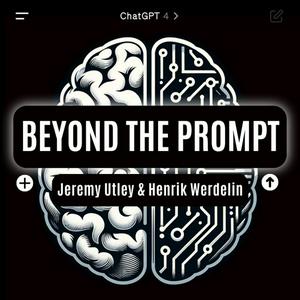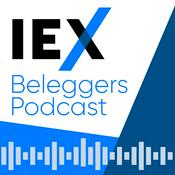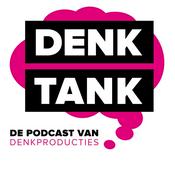Beyond The Prompt - How to use AI in your company
Jeremy Utley & Henrik Werdelin

Nieuwste aflevering
59 afleveringen
Here’s How to Know If You’re Getting the Most Out of AI – with Bryan McCann, CTO of You.com
04-2-2026 | 59 Min.In this episode, Bryan McCann joins Henrik and Jeremy to explore how search is evolving from simple queries into more conversational and agent-driven systems, and why prompting is likely a temporary skill. Bryan shares how his definition of productivity changed as an AI researcher, moving away from doing the work himself and toward designing plans and experiments that machines could run continuously.
The conversation expands to leadership and organizational design. Bryan explains why helping others learn how to work with AI became his highest-leverage activity, and offers a simple rule of thumb: try to get AI to do the task first, and treat anything it can’t do as an interesting research problem. Henrik and Jeremy connect this to Bryan’s view that organizations may increasingly resemble neural networks, with information flowing more freely and decisions less tied to rigid hierarchies.
Key Takeaways:
Productivity can be measured by machine output, not human effort
Bryan explains how “keeping the GPUs full” became his primary measure of productivity.
Prompting is useful, but likely temporary
The episode discusses why future systems may rely less on explicit prompts and more on inferred context.
Try AI first, then learn from what it can’t do
Tasks AI struggles with can reveal meaningful research opportunities.
Leadership is about scaling others
Bryan shares how his focus shifted from scaling himself to helping his team increase impact.
Organizations may benefit from neural-network-like design
Better information flow and fewer bottlenecks can improve decision-making.
YOU: You.com
Bryan's website: bryanmccann.org
LinkedIn: linkedin/company/youdotcom/
00:00 Intro: Keeping the GPUs Full
00:22 Meet Bryan McCann: CTO & co-founder of You.com
00:43 Why Search Is Breaking - and Why It Becomes a Skill
01:41 From Search to Agents
03:18 The Case for Proactive, Context-Aware AI
04:30 We Don’t Need New Hardware - We Need Trust
05:43 The Trust Problem of Always-On Listening
07:57 Trust as the Real Bottleneck (Not AI Capability)
09:52 Delivering Immediate Value to Earn Trust
12:13 Business Models and Escaping the Attention Economy
17:27 What “Agents” Really Mean - and Why the Term Will Fade
20:37 Productivity, Parkinson’s Law, and Keeping the Machines Running
23:52 Scaling Yourself vs. Scaling Your Team
29:57 Building Culture: Automate, Throw Away, Rebuild
35:46 Designing Organizations Like Neural Networks
45:02 Recruiting for Initiative in an AI-Native Organization
49:18 The debrief
📜 Read the transcript for this episode: podcast.beyondtheprompt.ai/heres-how-to-know-if-youre-getting-the-most-out-of-ai-with-bryan-mccann-cto-of-youcom/transcript
For more prompts, tips, and AI tools. Check out our website: https://www.beyondtheprompt.ai/ or follow Jeremy or Henrik on Linkedin:
Henrik: https://www.linkedin.com/in/werdelin
Jeremy: https://www.linkedin.com/in/jeremyutley
Show edited by Emma Cecilie Jensen.Building An Enterprise AI Innovation Lab: A Master Class with Humza Teherany, Chief Strategy Officer of Maple Leaf Sports and Entertainment
21-1-2026 | 58 Min.In this episode, Humza Teherany breaks down how he bridges deep technical fluency with strategic leadership at MLSE, home to the Raptors, Maple Leafs, and more. He shares how a vacation turned into an AI reawakening and how that hands-on immersion led to a fundamental shift in how his organization builds and experiments.
Humza walks through MLSE’s build in a day practice, their internal AI platform, and why speed to prototype now unlocks more than just efficiency. It changes who gets to shape the future. He, Jeremy, and Henrik explore the limits of traditional enterprise AI rollouts and how to build spaces for superusers that enable company-wide transformation. The conversation covers how technical literacy impacts credibility, why idea execution is the new differentiator, and how Humza’s five-year-old inspired a bedtime story app powered by AI.
Whether you're a CTO, a founder, or just figuring out where to start, Humza makes a compelling case. The best leaders don’t delegate this moment. They build.
Key Takeaways
Leaders should not delegate the AI moment
Humza, Henrik, and Jeremy agree that this is a moment for leaders to be hands-on. The ones who build and explore the tools themselves are the ones unlocking real impact.
Technical fluency builds credibility and better decisions
Humza’s return to his technical roots has changed how he leads. Understanding how AI works helps leaders earn trust and make smarter, faster choices.
Speed enables inclusion
MLSE’s build in a day model allows more people to contribute ideas and see them turned into real prototypes. Moving fast isn’t just efficient - it changes who gets to participate.
Empower your superusers first
Rather than starting with enterprise-wide training, Humza focuses on enabling the small group already eager to build. That early energy helps drive broader culture change.
MLSE: mlse.com
LinkedIn: Humza Teherany - LinkedIn
00:00 Intro: Humza Teherany and MLSE
00:27 The Role of C-Suite Leaders in AI
01:08 Reconnecting with Technical Skills
02:08 Diving Deep into AI Tools
03:03 The Importance of Hands-On Learning
04:25 Progression from Consumer to Technical AI Tools
07:28 Building a Business Case for AI
10:03 Creating a Culture of Innovation
14:00 Implementing AI in Business Operations
21:05 Challenges and Strategies in AI Adoption
26:17 Organizational Structure for AI Success
32:02 The Importance of Reviewing and Planning Code
33:01 The Future of Solo Developers and New Technologists
34:58 Reimagining Company Structures with AI
38:55 Key Skills for Future Technology Leaders
41:19 Personal AI Experiments and Innovations
46:52 Encouraging Creativity in Children with AI
49:11 The Debrief
📜 Read the transcript for this episode: building-an-enterprise-ai-innovation-lab-a-master-class-with-humza-teherany-chief-strategy-officer-of-maple-leaf-sports-and-entertainment/transcript
For more prompts, tips, and AI tools. Check out our website: https://www.beyondtheprompt.ai/ or follow Jeremy or Henrik on Linkedin:
Henrik: https://www.linkedin.com/in/werdelin
Jeremy: https://www.linkedin.com/in/jeremyutley
Show edited by Emma Cecilie Jensen.- In this teaser, Henrik and Jeremy debrief their conversation with Humza Teherany, Chief Strategy and Innovation Officer at MLSE. They reflect on how Humza rebuilt his technical fluency, why he believes leaders can't delegate this moment, and what it actually looks like to launch an internal AI lab that ships in 24 hours. Full episode out next week.
Full episode LIVE NOW.
For more prompts, tips, and AI tools. Check out our website: https://www.beyondtheprompt.ai/ or follow Jeremy or Henrik on Linkedin:
Henrik: https://www.linkedin.com/in/werdelin
Jeremy: https://www.linkedin.com/in/jeremyutley
Show edited by Emma Cecilie Jensen. Why AI Gets People Wrong: The Real Source of Insight with Anthropologist Mikkel B. Rasmussen
06-1-2026 | 56 Min.Mikkel B. Rasmussen brings a rare lens to the AI conversation. As an applied anthropologist, he has spent decades helping companies like LEGO uncover what is really going on beneath the surface.
In this episode, he shares how deep insight often begins with being wrong, why surprise is the clearest sign you have found something meaningful, and how the pain of not knowing is essential to breakthrough thinking. He also explains how AI is transforming his own research, from pattern recognition to video ethnography, and introduces a provocative idea: Anthropology Without Anthropologists.
Jeremy and Henrik reflect on what it means to teach AI how to surprise us, how synthetic data might reshape experimentation, and why better insights begin with better questions.
Key Takeaways
Insight starts with being wrong
Mikkel defines insight as the gap between how we think the world works and how it actually is. Anthropology helps uncover these mismatches, and that is where real breakthroughs begin.
Pain is part of the process
Mikkel and Jeremy both reflect on the emotional struggle that precedes insight. The doubt, sleepless nights, and questioning whether the work will ever come together is not failure. It is a necessary stage of discovery.
Surprise is a signal
The moment of surprise, when a new pattern emerges or an assumption is shattered, is at the core of applied anthropology. For Mikkel, it is the clearest sign that you have found something real.
AI can accelerate experimentation
Mikkel shares how AI is already helping his team analyze patterns, run faster experiments, and even conduct interviews that outperform humans in some cases. The goal is not to replace people but to push the limits of what is possible.
HARL: humanactivitylab.com
00:00 Intro: Why This Conversation Matters
00:25 Meet Mikkel: Founder of Human Activity Laboratory
01:14 Understanding Anthropology and AI
03:32 Applied Anthropology: Tools and Techniques
04:56 The Role of Narratives in AI
07:06 The Importance of Sensory and Social Dimensions
13:06 Case Study: LEGO and the Anthropology of Play
21:07 The Role of Surprise in Anthropology
27:51 AI and Human Synergy
31:26 Exploring AI's Limitations and Potential
32:46 Anthropology Without Anthropologists
34:17 AI's Role in Generating Insights
37:23 Human Bias in AI-Generated Ideas
42:05 Synthetic Data and Its Applications
47:34 The Future of AI in Anthropology
49:25 The Debrief
📜 Read the transcript for this episode: why-ai-gets-people-wrong-the-real-source-of-insight-with-anthropologist-mikkel-b-rasmussen/transcript
For more prompts, tips, and AI tools. Check out our website: https://www.beyondtheprompt.ai/ or follow Jeremy or Henrik on Linkedin:
Henrik: https://www.linkedin.com/in/werdelin
Jeremy: https://www.linkedin.com/in/jeremyutley
Show edited by Emma Cecilie Jensen.Teaser: What We Learned From Anthropologist Mikkel B. Rasmussen About Why AI Gets People Wrong
06-1-2026 | 8 Min.In this teaser, Jeremy and Henrik debrief their conversation with Mikkel B. Rasmussen, founder of the Human Activity Laboratory. They expected a conversation about AI’s limitations, but got a rethinking of insight itself. They explore Mikkel’s definition of insight as the gap between how we think the world is and how it actually is, why surprise is a critical signal, and how pain often precedes clarity. They also touch on Mikkel’s experiments with AI interviewers that sometimes outperform human researchers, and why this episode challenged how they think about narrative, understanding, and the role of AI.
Full episode LIVE NOW.
For more prompts, tips, and AI tools. Check out our website: https://www.beyondtheprompt.ai/ or follow Jeremy or Henrik on Linkedin:
Henrik: https://www.linkedin.com/in/werdelin
Jeremy: https://www.linkedin.com/in/jeremyutley
Show edited by Emma Cecilie Jensen.
Meer Zaken en persoonlijke financiën podcasts
Trending Zaken en persoonlijke financiën -podcasts
Over Beyond The Prompt - How to use AI in your company
Beyond the Prompt dives deep into the world of AI and its expanding impact on business and daily work. Hosted by Jeremy Utley of Stanford's d.school, alongside Henrik Werdelin, an entrepreneur known for starting BarkBox, prehype and other startups, each episode features conversations with innovators and leaders to uncover pragmatic stories of how organizations leverage AI to accelerate success. Learn creative strategies and actionable tactics you can apply right away as AI capabilities advance exponentially.
Podcast websiteLuister naar Beyond The Prompt - How to use AI in your company, Lotgenoten Podcast en vele andere podcasts van over de hele wereld met de radio.net-app

Ontvang de gratis radio.net app
- Zenders en podcasts om te bookmarken
- Streamen via Wi-Fi of Bluetooth
- Ondersteunt Carplay & Android Auto
- Veel andere app-functies
Ontvang de gratis radio.net app
- Zenders en podcasts om te bookmarken
- Streamen via Wi-Fi of Bluetooth
- Ondersteunt Carplay & Android Auto
- Veel andere app-functies


Beyond The Prompt - How to use AI in your company
Scan de code,
download de app,
luisteren.
download de app,
luisteren.































